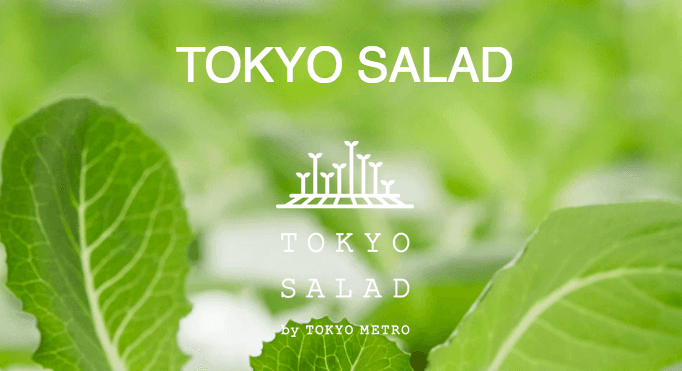
The farm-to-table (also called farm-to-fork) movement has been all the rage for several years, and despite some dubious behavior, one can argue it has helped strengthen relationships between farmers, restaurants, consumers and most importantly – the food we eat.
In Japan, this trend has taken its very own twist in Tokyo, with one of the city’s rail transit operators dabbling in hydroponic farming the past few years.
As showcased recently in one of Tokyo’s major daily newspapers, the company, Tokyo Salad, is growing about 400 plants in what was previously an unused warehouse located under one of the subway system’s elevated transit lines. The startup, a joint venture between rail operator Tokyo Metro and a development company, currently markets 11 varieties of greens.
The facility, in which LED lights shine on plants 16 hours a day, raises basil, kale and lettuces without the use of any soil or fertilizers. Water used to mist these plants include minerals such as zinc, phosphorous and potassium. And this uber-hygienic operation is a more sophisticated venture than your local hydroponics store: as one Tokyo Metro employee explained to Public Radio International (PRI) when the venture first started, the five-week process that turns seeds into greens is largely treated as a trade secret.
It's important to remember Tokyo Salad and other urban hydroponic growers will not shake up Japan’s food industry in the near term. Do not expect the greens to show up in the legendary food halls in Tokyo’s department stores for a while. Nor are they expected to appear in the countless mom-and-pop and chain markets that dominate much of Japan’s retail landscape. At the moment, most of Tokyo Salad’s customers are high-end restaurants in Tokyo’s top hotels or trendy cafes.
The idea of growing food as close as possible to where it is finally eaten is also hardly a new concept in Japan. Several years ago, for example, a local Subway sandwich shop made waves for growing lettuce in-store in an attempt to win over customers looking for more sustainable lunch options. Meanwhile, Japan’s limited farmland and high density has turned into a laboratory attempting to find new ways to feed its population.
What makes Tokyo Salad stand out, however, is that it shows how an organization can think far outside the box while seeking new business ventures. As profiled on PRI, the population of Tokyo (and Japan at large) is expected to decline in the coming years and decades – which means ridership will decrease, putting pressure on Tokyo Metro to find other ways to generate revenues.
Urban farming could become a key strategy as Japan seeks to strengthen the country’s food security this century. Although Japan has been one of the most generous donor nations in the quest to boost food security and other resilience measures worldwide, the country faces its own food security risks. Climate change, a highly urbanized population that has led to dependence on part-time farmers - and, of course, geopolitics (the country is in North Korea’s cross-hairs, after all) all threaten the country’s food future. Furthermore, Japan’s increased dependence on imported foods, in part to changing consumer tastes, also leaves the nation of 127 million people vulnerable.
Technology could help Japan scale up its local food production, especially if unused spaces long assumed hostile to raising food, like old warehouses, can increasingly do so cost effectively and at a profit. And if that technology transfer can move across borders and become affordable, urban farming could feed the world and create a new wave of jobs.
Image credit: Tokyo Salad

Leon Kaye has written for 3p since 2010 and become executive editor in 2018. His previous work includes writing for the Guardian as well as other online and print publications. In addition, he's worked in sales executive roles within technology and financial research companies, as well as for a public relations firm, for which he consulted with one of the globe’s leading sustainability initiatives. Currently living in Central California, he’s traveled to 70-plus countries and has lived and worked in South Korea, the United Arab Emirates and Uruguay.
Leon’s an alum of Fresno State, the University of Maryland, Baltimore County and the University of Southern California's Marshall Business School. He enjoys traveling abroad as well as exploring California’s Central Coast and the Sierra Nevadas.














